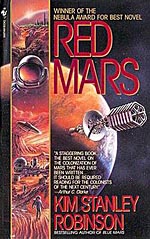
![]() ethawyn
ethawyn
9/22/2009
![]()
I finally arrived at the end of Red Mars and has it ever been a journey. I can't even remember when I started the book, but I know I've been reading it for a long time. Reading Red Mars has been, really, quite an exhausting effort. The book is long, heavy and slow, but also rich with character, sociology and science (real science). Usually, when I actually picked up the book and read it I thoroughly enjoyed myself, but I never felt like reading it when I wasn't. Because of this, I spent a great deal of time reading other books while I crawled through this one.
Robinson's work has been called "literary science fiction" and it's easy to see why, he deals well with the issue. In many ways, modern science fiction has a lot of similarities to Victorian literature, and Robinson embodies this to the fullest in its obsession with detail, its desire to portray a whole society, and its interest in the effect of environment on the individual and vice versa. Indeed, Robinson's long and detailed descriptions of the Martian landscape reminded me very much of George Elliot's description of the English countryside in The Mill on the Floss.
There was a long stretch of time where I wasn't sure if I liked this book. The pace is plodding and most of the characters are not very likable. Also, this piece is hard science fiction in the truest sense of the term and can get bogged down in technical details (there's even a section where Robinson has a chart showing the Martian calendar). Still, on the whole his portrayal of the science is effective and not boring, and it helps to ground the story. Also, the above-mentioned descriptions of Mars really help to make the setting come alive, and really portray the wonder and the alien nature of the planet. While Robinson takes a long time to get things moving, this allow him to make a convincing portrait of a human society developing on Mars, and the ultimate payoff is worth it (unlike, for example, the payoff in Dune).
Still, the book is not perfect and I really wish there were more characters I liked. Perhaps it's a weakness of mine, but I really have trouble with fiction that lacks people I can admire (this was the problem I had with the new Battlestar Galactica). I'm also not a fan of the fact that the only Christian character in the book is a particularly nasty person, and it is too some extent stated that this is because of her beliefs. Of course, bad Christian beliefs can lead to nasty people, and the belief that this is the cause of her nastiness is in the mind of someone with a bias, so the writer is not necessarily portraying this as cold hard fact. I also have a distaste for the sexual morality of the characters. Of course, many people have this kind of morality, but, as I've said before, I tire of it being the norm in all of the fiction I like.
Ultimately, Red Mars is a very solid book and a worthwhile read for those who like science and sociology, and who have an unusual amount of patience.
http://ethawyn.livejournal.com